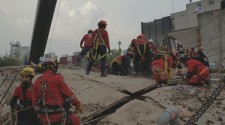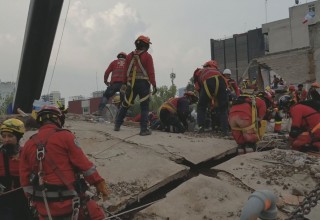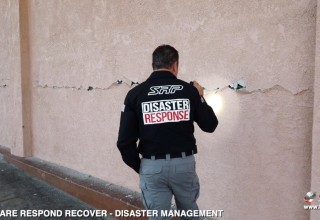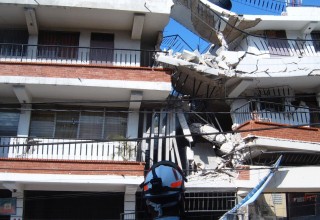
LOS ANGELES, August 18, 2020 (Newswire.com) - With its decades of experience, Strategic Response Partners (SRP) lives and breathes planning for and rapid response to all sorts of catastrophic natural disasters. In fact, the Los Angeles-based firm has a well-earned reputation as a leader in the field. In line with its position as an innovator and the nationwide “go-to“ disaster preparedness and response firm, SRP continues to lead the path forward in preparing for and responding to all earthquake-related issues. With the number of earthquakes occurring and predictions of more continually on the rise, SRP has made it a top priority to help the general public, commercial building owners, schools, hospitals, and critical infrastructure become well-prepared for the so-called “Big One.“
SRP’s Managing Partner Steve Slepcevic points to various recent seismic events and scientific findings to emphasize the importance of preparedness:
- A 5.1 magnitude earthquake struck North Carolina last week - the largest quake to hit the state since 1916, according to the National Weather Service.
- The Salt Lake Valley of Utah experienced a 5.7 magnitude earthquake in March.
- The U.S. Geological Survey last week noted a swarm of minor earthquakes near California's Salton Sea that raises concern about the potential for a larger temblor at the San Andreas Fault. Such a swarm is atypical for this particular part of the state.
- Geologists predict a chance of a magnitude 9-plus earthquake hitting Oregon and Washington in the next 50 years and a nearly 40 percent chance of a magnitude 8 to 9 earthquake hitting Southern Oregon and/or Northern California.
- This month, scientists for the first time confirmed the existence of extremely powerful "boomerang" earthquakes, opening the possibility of even more devastating types of seismic events.
Taking into account his decades of experience, Slepcevic also recommends: “By taking some simple steps in advance of an earthquake or other natural disaster, people can help save lives and prevent injury, all while decreasing the extent of damage to their homes, businesses, property, and personal possessions, as it is also very important to arm oneself with basic knowledge about what causes earthquakes and, in turn, the hazards that can occur.”
Earthquakes occur when rocks underground break along a fault line, resulting in seismic waves that cause the ground to shake. This shaking can last for a few seconds or up to several minutes and can vary in the degree of strength. For Californians, earthquakes are a common occurrence, and Los Angeles is especially susceptible due to its proximity to multiple faults, including the San Andreas Fault, where two tectonic plates come together. This geological phenomenon sits within 35 miles of Los Angeles, subjecting the city to more frequent and stronger quakes than other cities.
Slepcevic further cautions that when an earthquake strikes, landslides, mudslides, and avalanches can occur and structures, whether large or small, can sustain extensive damage. Likewise, saturated soil can cause buildings to sink. Ground displacement and shifting, flooding, and fires also commonly occur as a result of nearby seismic activity.
As a result of the ever-increasing concern of future seismic activity, Slepcevic and his critical response team at SRP recommend a few basic actions that all home and business owners can take to help protect people and property. Specifically: 1. Secure bookshelves and dressers to walls; 2. Apply an adhesive, such as museum putty, to objects on tables; 3. Install clips and clasps on cabinet doors to prevent glasses and plates from sliding out and breaking on floors; 4. Hire a plumber to install earthquake-safety shut-off valves that will quickly turn off a gas supply in the event of a quake; and 5. Develop a communication and evacuation plan with employees or loved ones.
There are additional preparedness tools such as mobile apps available for iPhones and Androids that can provide statewide earthquake early-warning alerts. Additionally, Oct. 15 is designated as International Shakeout Day, where people around the world are encouraged to practice their earthquake communication and evacuation plan from each applicable location.
While basic earthquake-preparation steps are always recommended for individual homeowners, commercial building owners, municipalities, schools, hospitals, daycare centers, nursing homes, and all other critical infrastructure, each should have a well-vetted emergency disaster preparedness plan in place prior to any catastrophic natural disaster, including an earthquake. Having the right plan in place, created by those in the know, can make all of the difference to a business‘ ability to survive and recover from a natural disaster. According to Slepcevic, SRP can provide each of these entities with a detailed review of their disaster preparedness plan by its world-renowned team of disaster planners and structural engineers to help ensure their current strategy is comprehensive and effective. SRP even assists businesses in designing and implementing a custom disaster preparedness plan.
“Even if disaster strikes and you don’t have any policies, procedures or plans in place, rest assured, it’s not too late for us to deploy the necessary assistance. We also advise the public to immediately call us following a quake so our engineers and technicians can review the structural integrity of their home or business and perform necessary emergency work to avoid collapse, injury or even death,” stressed Slepcevic. “Our emergency service crews also stand ready to check for and stop gas leaks that can cause fires and explosions, and to correct water damage from burst pipes and other sources.”
SRP has become a company that thousands of clients worldwide depend on. It even has a technical rescue team that is activated when individuals may be trapped in compromised structures or by fallen debris. “Anyone familiar with California’s history with earthquakes knows the incredible damage that can be done to property and the number of lives that can be lost when a major one strikes. As these incidents are becoming more prevalent and frequent, we all need to be vigilant in planning and preparing,” added Slepcevic.
SRP’s rapid response team of experts specializes in disaster preparedness, response, and property restoration management resulting from earthquakes, fires, water, wind, hail, hurricanes, explosions and other event-driven disasters, providing complete disaster project management for residential, commercial, industrial, institutional, municipal, and historic properties.
For more information, go to srp24.com or call (888) 582-5848.
Media Contact: Steve Slepcevic, (888) 582-5848 or response@srp24.com
Source: Strategic Response Partners
Share:


